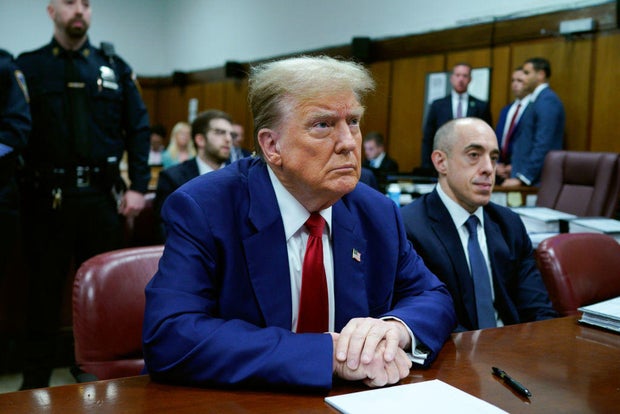Prosecutors in former President Donald Trump’s criminal trial in New York called their fifth witness to the stand as proceedings continued Tuesday: Keith Davidson, an attorney who represented Daniels and model Karen McDougal as they sought deals in 2016 for their stories alleging sexual encounters with Trump.
Former National Enquirer publisher David Pecker testified previously that he paid McDougal $150,000, through Davidson, in August 2016, but never received a reimbursement he expected from Trump. When Davidson approached the Enquirer with Daniels’ story that October, Pecker said he referred him to Trump’s then-attorney, Michael Cohen. Pecker said he told Cohen he would not pay to buy the rights to another story about Trump, but advised Cohen to do so himself.
Cohen paid Daniels $130,000 via wire transfer. Prosecutors say Trump and Cohen “conspired” in a scheme to cover up Trump’s reimbursements to Cohen for the payment, with the goal of hiding why Trump was paying Cohen. Trump has pleaded not guilty to 34 felony falsification of business records counts in the case and has denied all allegations, including that he had extramarital sexual encounters.
Davidson took the stand after testimony from Gary Farro, Cohen’s former banker who told jurors about Cohen’s “urgent” efforts to set up new bank accounts to use to wire the money. He was followed by two other witnesses who verified other pieces of evidence.
What’s happening at Trump’s trial
Judge Juan Merchan began the third week of proceedings by giving Trump good and bad news. He approved a request by Trump to adjourn court on May 17 so he can attend his son’s high school graduation. Eric Trump, another one of the former president’s sons, is in the courtroom for Tuesday’s proceedings, the first time one of Trump’s family members has accompanied him to court.
But then the judge issued the ruling that prosecutors have sought for more than a week. Merchan found Trump in contempt of court for violating a gag order limiting what he can say about those involved in the case.
Merchan said Trump violated the order nine times in recent weeks in posts on his Truth Social platform and campaign website. He fined Trump $9,000 and ordered him to delete the posts. He noted in his written ruling that New York law doesn’t allow him to impose a fine of more than $1,000 per violation, and said that amount might not dissuade future violations by defendants who can afford to pay the fine.
Merchan concluded the written ruling with a warning to Trump: “Defendant is hereby warned that the Court will not tolerate continued willful violations of its lawful orders and that if necessary and appropriate under the circumstances, it will impose an incarceratory punishment.”
After the contempt ruling, Farro retook the stand.
He walked a prosecutor through a harried series of emails and phone calls on Oct. 26, 2016 and Oct. 27, 2016, when Cohen set up the new bank account and funded it with $131,000 from his own personal home equity line of credit.
The next day, Cohen authorized a transfer of $130,000 to an account associated with Keith Davidson, an attorney for Daniels. Cohen had described the account and transaction as related to real estate consulting, Farro testified, reiterating that the request was “urgent.”
Farro said the transaction would have been delayed if Cohen indicated the transfer involved either a political candidate or an adult film star. He said any transaction involving a political candidate would have received “additional scrutiny” to ensure it was legal.
But he offered a different explanation of why the bank would have scrutinized a payment to Daniels. He said the bank was wary of facilitating the adult film industry.
“For something like that, we might have considered that a reputational risk,” Farro said.

